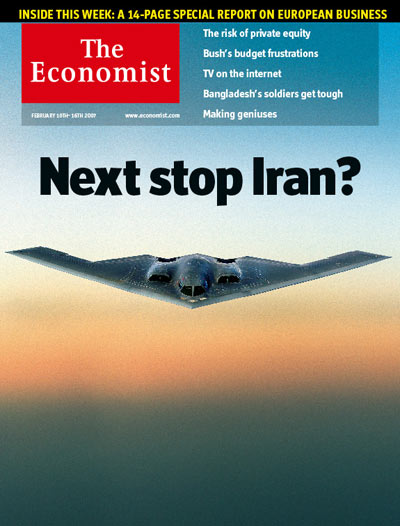- Sep 14, 2004
- 2,677
- 481
- 98
The chances that Iran will stop uranium enrichment, and the drive to obtain nuclear weapons, are next to zero. They believe that nuclear weapons will guarantee the survival of the totalitarian and terrorist Mullah regime.
The Economist Magazine thinks that an armed strike against Iran may not be necessay. I have my doubts, but we will see.Tehran Deplores G8 Statement Against Iran's Nuclear Program
Jun 10, 2007, 8:11 GMT
Deutsche Presse-Agentur
Complete article: http://news.originalsignal.com/arti...lear-programmes-monsters-and-critics-com.html
Tehran - Tehran on Sunday deplored the final statement by the leaders of the Group of Eight (G8) against Iran's nuclear programmes.
'It is deplorable that the G8 paid no attention to the legal aspects of Iran's nuclear programmes such as International Atomic Energy Agency (IAEA) reports and our constant cooperation with the IAEA,' Foreign Ministry Spokesman Mohammad-Ali Hosseini said.
'The G8 statement therefore lacks any legal or internationally acknowledged basis,' the spokesman added in his weekly press briefing.
The G8 had warned Iran that harsher sanctions would be adopted if the Islamic state did not halt uranium enrichment in line with United Nations Security Council resolutions.
'There will be no enrichment suspension in whatever form,' the spokesman reiterated Iran's position.
Complete article: http://www.economist.com/opinion/displaystory.cfm?story_id=8668903
Every effort should be made to stop an Iranian bomb. But there is a better way than an armed strike. In 2002 Mr Bush consigned Iran along with Iraq and North Korea to an axis of evil. Since 2004, for lack of good alternatives, he has been helping the efforts of Britain, France and Germany to talk rather than bludgeon Iran into nuclear compliance. Iran claims that its nuclear programme is for civil purposes only. Last year, the Europeans called its bluff by offering trade, civil-nuclear assistance and a promise of talks with America if it stopped enriching the uranium that could produce the fuel for a bomb. When Iran refused, diplomacy led in December to the imposition of economic sanctions by the Security Council.
This is a promising approach. The diplomacy at the United Nations proceeds at a glacial pace. But Iran is thought to be several years from a bomb. And meanwhile the Americans, Europeans, Russians and Chinese have at last all lined up on the same side of the argument. What is required now is a further tightening of the economic squeeze coupled with some sort of an incentivemost usefully an unambiguous promise from Mr Bush that if Iran returns to compliance with the nuclear rules it will face no attempt by America to overthrow the regime. Even then, America and Iran may be fated to lock horns in the Middle East. But the region, and the world, will be a good deal safer without the shadow of an Iranian bomb.

